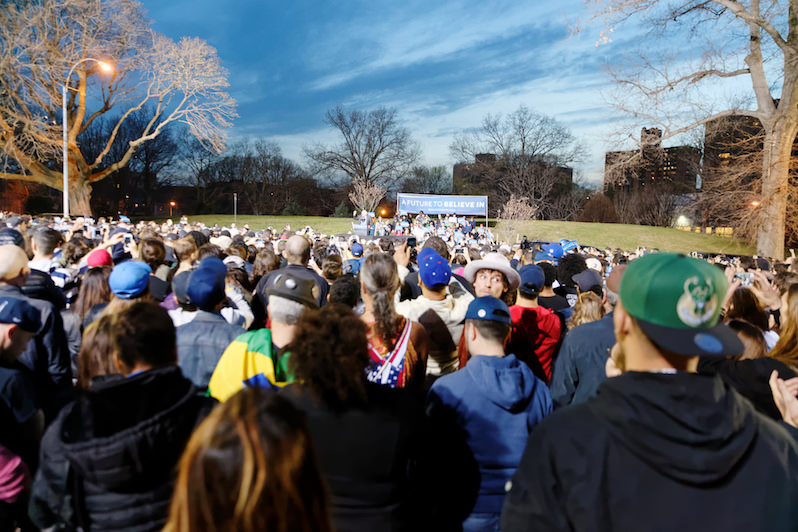Millennials ‘Search for Truth’ on Election and Distrust Media, Intelligence Firm Reports
Young voters are using critical thinking, research and social media engagement to decide whom they want as their next president. The big question is whether they will be motivated to vote for candidates that anger and disappoint them.
A crowd of majority young voters gather at a South Bronx rally for Sen. Bernie Sanders in March. (Michael Vadone / CC 2.0)
Don’t believe the hype about millennial voters. This bloc of the U.S. population, ages 18 to 35 and whose numbers are estimated to be about 69.2 million, may have a reputation for not engaging with the political system — but that is not the case for this election, The Intelligence Group reports, based on a recent study.
“Leading up to the presidential election, millennials are taking advantage of their hacking mindset to create their own persuasion journey to get to the truth,” The Intelligence Group, a part of global marketing agency Deep Focus that performs research for corporations and government organizations, states in a report that quotes numerous millennial voters.
This subset of the electorate will play an important role at the ballot box, and its members are doing their homework.
“The media is a joke,” said Joseph, 31, a moderate in the study. “I research things much more. I Google the topic, and then I sift through a bunch of media spin to try and see if it’s true or not.”
The group’s research, conducted through “a blended approach of social listening and qualitative insights generated via real-time social conversations,” found millennials fact-checking the presidential candidates’ assertions and engaging with their peers on social media sites and forums such as Reddit, Twitter and Facebook to “make an informed opinion and hold candidates accountable.”
During the first presidential debate, for example, The Intelligence Group reported that Americans posted 138,000 tweets to fact-check the candidates in real time. This eagerness to critically assess the candidates stems from a distrust of both media and the candidates themselves.
“I don’t believe there is such a thing as a truly objective source,” said Kelly, 25, a liberal. “It’s up to the individual to factor in the relative objectivity of a source when making their opinion.”
The millennial vote is an increasingly significant one. This year, data show that millennials already match the baby boomers (those born between 1946 and 1964) as the largest voting-age group in America, according to the Pew Research Center. Census Bureau data show that roughly 1 in 6 voters in the past two presidential elections were younger than 30.
The presidential campaigns have taken note of these numbers, “firing on all cylinders” to target millennials, according to Kristin Lynch, communications coordinator for the Clinton campaign in Denver. Clinton’s team referred to social media and, specifically, Facebook Live, as crucial to reaching young voters.
“[Trump] is really facing an uphill battle when people are only hearing what the media is saying,” Rachel Keane, the Trump campaign’s Colorado millennial outreach co-chairwoman, told USA Today.
In the 2012 election, President Obama won over millennials by a landslide against rival Mitt Romney, garnering 60 percent of the youth vote.
“If millennials vote en masse, they have a chance to determine the election’s outcome,” writes Courtney Crowder of the Des Moines Register.
The next big question is whether they will be motivated enough to actually vote.
Independent journalism is under threat and overshadowed by heavily funded mainstream media.
You can help level the playing field. Become a member.
Your tax-deductible contribution keeps us digging beneath the headlines to give you thought-provoking, investigative reporting and analysis that unearths what's really happening- without compromise.
Give today to support our courageous, independent journalists.






You need to be a supporter to comment.
There are currently no responses to this article.
Be the first to respond.